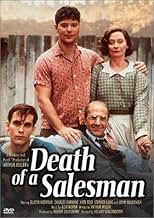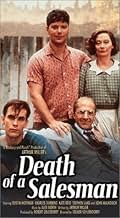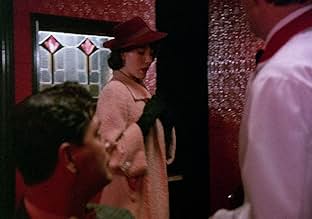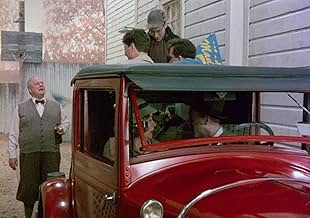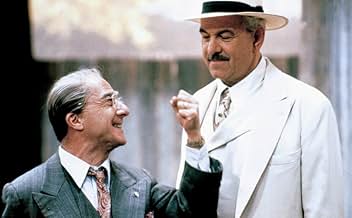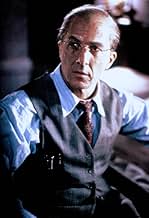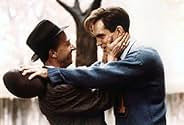A Morte de um Caixeiro-Viajante
Título original: Death of a Salesman
AVALIAÇÃO DA IMDb
7,2/10
12 mil
SUA AVALIAÇÃO
Um velho caixeiro-viajante reconhece o vazio de sua vida e tenta consertá-lo.Um velho caixeiro-viajante reconhece o vazio de sua vida e tenta consertá-lo.Um velho caixeiro-viajante reconhece o vazio de sua vida e tenta consertá-lo.
- Ganhou 3 Primetime Emmys
- 7 vitórias e 12 indicações no total
David Chandler
- Bernard
- (as David S. Chandler)
Kathryn Rossetter
- Woman from Boston
- (as Kathy Rossetter)
Avaliações em destaque
I had to read Arthur Miller's Death of a Salesman` for my English class this year. Our teacher was a very industrious woman and let us analyze every character's every word several times, until we couldn't hear the words Willy`, Linda`, Biff`, American Dream` and stockings` any more. It was terrible! She didn't show us any theater or film version, so we began to utterly dislike the text as a whole: a sentimental play where you already know the ending when you read the title.
A few days ago, I spotted Volker Schlöndorff's film version on television, a German dubbed version, but that doesn't matter because I already knew the lines and Schlöndorff hardly changed them.
Fortunately, Schlöndorff didn't make any effort to put his own special style into the movie, he just left the play the way it was and the way, I suppose, Arthur Miller wanted it. So some of you might claim that this version was too stage-drama-like, not cinematic. For me, this was ideal because I could see the REAL, lively Death of a Salesman`, played by an ideal cast: Dustin Hoffman: a little over-acting, but enthusisiastic; Kate Reid: so authentic that she could be taken for my mother; John Malkovich: silent, thoughtful, self-confident`, great! How shall I put it? This film sort of opened my eyes towards this great, merciless work of Arthur Miller. This play is something you can orientate your life to. At many important turning points of your life, you can remember Willy Loman and his fate that is fictitious but and believe me, I know some people who are exactly like him definitely could be the fate of a real person, and not only of an American. I found the Salesman` important, not as much as a criticism of the American Dream but an account of what must happen, if lives are built upon lies lies to others and lies to yourself. Those people who think Death of a Salesman` is rubbish are those who suppress cruel truths just as Willy Loman does.
So, when I saw this movie, I was completely stunned because its hopelessness became clear to me and I noticed how crucial this American classic really is. I give Schlöndorff 8 out of 10 stars because there are some flaws in his way of directing (e. g. letting Malkovich and Lang play their young alter egos was stupid because no one believes that they are 17).
Another sad example how bad teachers can destroy a masterpiece. Shame on you, Mrs. H.!
A few days ago, I spotted Volker Schlöndorff's film version on television, a German dubbed version, but that doesn't matter because I already knew the lines and Schlöndorff hardly changed them.
Fortunately, Schlöndorff didn't make any effort to put his own special style into the movie, he just left the play the way it was and the way, I suppose, Arthur Miller wanted it. So some of you might claim that this version was too stage-drama-like, not cinematic. For me, this was ideal because I could see the REAL, lively Death of a Salesman`, played by an ideal cast: Dustin Hoffman: a little over-acting, but enthusisiastic; Kate Reid: so authentic that she could be taken for my mother; John Malkovich: silent, thoughtful, self-confident`, great! How shall I put it? This film sort of opened my eyes towards this great, merciless work of Arthur Miller. This play is something you can orientate your life to. At many important turning points of your life, you can remember Willy Loman and his fate that is fictitious but and believe me, I know some people who are exactly like him definitely could be the fate of a real person, and not only of an American. I found the Salesman` important, not as much as a criticism of the American Dream but an account of what must happen, if lives are built upon lies lies to others and lies to yourself. Those people who think Death of a Salesman` is rubbish are those who suppress cruel truths just as Willy Loman does.
So, when I saw this movie, I was completely stunned because its hopelessness became clear to me and I noticed how crucial this American classic really is. I give Schlöndorff 8 out of 10 stars because there are some flaws in his way of directing (e. g. letting Malkovich and Lang play their young alter egos was stupid because no one believes that they are 17).
Another sad example how bad teachers can destroy a masterpiece. Shame on you, Mrs. H.!
A generation after Lee J. Cobb originated the role on stage and Fredric March did
the big screen version, Dustin Hoffman does a really great job as Willy Loman in
Death Of A Salesman in a made for television version. It's a bit more surreal than
the others but Arthur Miller's message about misplaced values certainly gets
across.
All poor Willy Loman wanted to be was be liked and that to him became a creed. It's how you sell your product, it's how you sell yourself. He loved his family, but he was always 'on'. And forever envious of brother Ben who went out and took risks but saw the world.
Hoffman was years younger than March or Cobb, but with makeup he certainly looks the part. Kate Reid plays the wife and John Malkovich and Stephen Lang are sons Biff and Hap. They really function well as the Loman family unit and the chemistry is real.
Seeing how much purchasing is now done on line, I wonder if a lot of the message of Death Of A Salesman will be lost in the future. An audience in the future might not know what a salesman is or does as personal contact in buying and selling becomes less and less.
I certainly hope not.
All poor Willy Loman wanted to be was be liked and that to him became a creed. It's how you sell your product, it's how you sell yourself. He loved his family, but he was always 'on'. And forever envious of brother Ben who went out and took risks but saw the world.
Hoffman was years younger than March or Cobb, but with makeup he certainly looks the part. Kate Reid plays the wife and John Malkovich and Stephen Lang are sons Biff and Hap. They really function well as the Loman family unit and the chemistry is real.
Seeing how much purchasing is now done on line, I wonder if a lot of the message of Death Of A Salesman will be lost in the future. An audience in the future might not know what a salesman is or does as personal contact in buying and selling becomes less and less.
I certainly hope not.
Because of its complex nature, its many morals, its non-linear flashbacks, and its over-the-top characters, I express extreme doubts when believing that Arthur Miller's renowned Death of a Salesman was meant to be read. The iconic play has won several awards, was performed in the 1940's over seven-hundred times resulting in four revivals on Broadway, and has continued to be translated and performed in countries other than the United States, where it originated. For a play, the story of Willy Loman's dysfunctional family has had unprecedented success. As a film, it has had its share of setbacks.
To my knowledge, never has a theatrical production of the film been made, which is depressing to note, seeing as directors like Roman Polanski have proved that they can transition a play to a screen-production with little to no constraints. What we were fortunate to get were not only several low-budget, TV renditions of the story Death of a Salesman, but we are grateful to get a telling of the story on film, written by the original author, Arthur Miller, made for the CBS network in September 1985. The story is kept the same, albeit some metaphorical and symbolical changes, as it revolves around Willy Loman, a naive, broken man who has failed at the game of life and business and has halted his family's growth because they are so committed to either boosting their leader's confidence or keeping him from sinking.
Willy's long suffering wife is Linda, played by Kate Reid, a miserable, shell of a woman so determined to help her husband through uncertain times she's forgotten how to help and better herself. Their two sons are two equally broken men living at home well into their thirties. They are Biff (John Malkovich, a gifted actor, who gave a terrific performance as Lenny in another acclaimed novel, Of Mice in Men in 1992), a football star brought down by the weight of his failure of a father, and Happy (Stephen Lang), a cocky ladies man replicating who Willy the characteristics Willy once gleefully held; brashness, confidence, and the ability to strike a deal.
The main problem with Willy is his naivety towards the business world and to himself; he continues to convince himself that the only thing necessary to succeed in business is a firm handshake and a high likability factor. By doing this, he convinces himself that by possessing those very important traits he can do anything, and yet he hasn't. He is roadblocked by not only that, but by his falsifying sense of optimism, telling himself and everyone around him that he is "not a dime a dozen" but Willy Loman, a unique individual. He is only more upset when he sees how his best friend Charley (Charles Durning) and brother Ben (Louis Zorich) have gone on to lead happy, successful lives with limitless wealth and opportunities, and he is confined to his cramped apartment, told to be himself which does nothing but let everyone down.
Willy is portrayed by Dustin Hoffman, a character actor with a barrage of films under his belt. Hoffman's performance of Willy is definitely admirable, but it isn't as layered as one would hope. He is written efficiently as a character victim by his own delusions, but several times does Hoffman seem like he is teetering on the lines of self-parody rather than seriousness, almost the equivalent to a Woody Allen archetype. Nonetheless, he is completely capable in this role, and when he hits the right notes, specifically in Charlie's office and during Willy's final monologue with the family (more commonly known as his "dime a dozen" speech), he truly shows what power and strength he brings to the table.
But perhaps the film can be known for not just taking a complex, theme-driven play and creating it into a very, very intriguing film, but also for bringing more style to a made-for-TV movie than anyone ever expected. The replication of the inherent seamy, humidity-soaked New York atmosphere is stunningly portrayed, with Willy Loman's listless agenda to only heighten the gloomy setting. The other aspect is the way the filmmakers constructed the environment. I've read that the set of Death of a Salesman is mainly composed of an old play setting, most likely from a version of the play, meaning several buildings don't have roofs, several backdrops are artificial, and several background buildings are one-dimensional cutouts designed to only give the look of the environment. This isn't as disconcerting as it sounds, but it livens the film to a new height, making it closer to the feeling of an actual play rather than abandoning the stage-feel to favor a more polished cinematic feel.
Schlöndorff's directorial efforts to make Death of a Salesman a functioning film and playwright Arthur Miller taking his personal material into his own hands to give fans and newcomers the version he wants on screen have both worked wonderfully. This is a complex picture, doing different things for different people and showing each person a different theme or meaning. Whether it be a commentary on the business world, a tragic story of a once-successful businessman who was never "once-successful," a picture showing an American's tragic existence, a failed American Dream, an insight into the tragic hero, or how one man can collectively bring down his entire family by his own delusional self, this is a gripping story made into a surprisingly efficient film with performances of impact and style to laud.
Starring: Dustin Hoffman, Kate Reid, John Malkovich, Stephen Lang, Charles Durning, and Louis Zorich. Directed by: Volker Schlöndorff.
To my knowledge, never has a theatrical production of the film been made, which is depressing to note, seeing as directors like Roman Polanski have proved that they can transition a play to a screen-production with little to no constraints. What we were fortunate to get were not only several low-budget, TV renditions of the story Death of a Salesman, but we are grateful to get a telling of the story on film, written by the original author, Arthur Miller, made for the CBS network in September 1985. The story is kept the same, albeit some metaphorical and symbolical changes, as it revolves around Willy Loman, a naive, broken man who has failed at the game of life and business and has halted his family's growth because they are so committed to either boosting their leader's confidence or keeping him from sinking.
Willy's long suffering wife is Linda, played by Kate Reid, a miserable, shell of a woman so determined to help her husband through uncertain times she's forgotten how to help and better herself. Their two sons are two equally broken men living at home well into their thirties. They are Biff (John Malkovich, a gifted actor, who gave a terrific performance as Lenny in another acclaimed novel, Of Mice in Men in 1992), a football star brought down by the weight of his failure of a father, and Happy (Stephen Lang), a cocky ladies man replicating who Willy the characteristics Willy once gleefully held; brashness, confidence, and the ability to strike a deal.
The main problem with Willy is his naivety towards the business world and to himself; he continues to convince himself that the only thing necessary to succeed in business is a firm handshake and a high likability factor. By doing this, he convinces himself that by possessing those very important traits he can do anything, and yet he hasn't. He is roadblocked by not only that, but by his falsifying sense of optimism, telling himself and everyone around him that he is "not a dime a dozen" but Willy Loman, a unique individual. He is only more upset when he sees how his best friend Charley (Charles Durning) and brother Ben (Louis Zorich) have gone on to lead happy, successful lives with limitless wealth and opportunities, and he is confined to his cramped apartment, told to be himself which does nothing but let everyone down.
Willy is portrayed by Dustin Hoffman, a character actor with a barrage of films under his belt. Hoffman's performance of Willy is definitely admirable, but it isn't as layered as one would hope. He is written efficiently as a character victim by his own delusions, but several times does Hoffman seem like he is teetering on the lines of self-parody rather than seriousness, almost the equivalent to a Woody Allen archetype. Nonetheless, he is completely capable in this role, and when he hits the right notes, specifically in Charlie's office and during Willy's final monologue with the family (more commonly known as his "dime a dozen" speech), he truly shows what power and strength he brings to the table.
But perhaps the film can be known for not just taking a complex, theme-driven play and creating it into a very, very intriguing film, but also for bringing more style to a made-for-TV movie than anyone ever expected. The replication of the inherent seamy, humidity-soaked New York atmosphere is stunningly portrayed, with Willy Loman's listless agenda to only heighten the gloomy setting. The other aspect is the way the filmmakers constructed the environment. I've read that the set of Death of a Salesman is mainly composed of an old play setting, most likely from a version of the play, meaning several buildings don't have roofs, several backdrops are artificial, and several background buildings are one-dimensional cutouts designed to only give the look of the environment. This isn't as disconcerting as it sounds, but it livens the film to a new height, making it closer to the feeling of an actual play rather than abandoning the stage-feel to favor a more polished cinematic feel.
Schlöndorff's directorial efforts to make Death of a Salesman a functioning film and playwright Arthur Miller taking his personal material into his own hands to give fans and newcomers the version he wants on screen have both worked wonderfully. This is a complex picture, doing different things for different people and showing each person a different theme or meaning. Whether it be a commentary on the business world, a tragic story of a once-successful businessman who was never "once-successful," a picture showing an American's tragic existence, a failed American Dream, an insight into the tragic hero, or how one man can collectively bring down his entire family by his own delusional self, this is a gripping story made into a surprisingly efficient film with performances of impact and style to laud.
Starring: Dustin Hoffman, Kate Reid, John Malkovich, Stephen Lang, Charles Durning, and Louis Zorich. Directed by: Volker Schlöndorff.
The salesman of the title is Willy Loman, a man in his early sixties, approaching retirement. Despite his long service, travelling from his New York base all over New England in the service of his employers, he has never enjoyed great success in his job. He is in financial difficulties, struggling to pay the mortgage on his house and the instalments on the consumer goods- refrigerator, vacuum cleaner, car- which were becoming popular in the forties but which represented a major commitment, even in middle class households. In order to make ends meet, he has taken to borrowing from his old friend Charlie.
His sense of failure, however, does not derive solely from his unsuccessful career. He also sees himself as having failed in his private life. Although his marriage to his loyal wife Linda has survived, despite the fact that he has on occasions been unfaithful to her, his relationships with his two sons are strained. Biff, the elder, showed promise when young in both the academic and sporting fields, but failed to win a place at university after failing a maths exam at school, and since has become a rootless drifter, alternating between dead-end jobs and petty crime. Biff has been particularly alienated from his father since discovering one of Willy's affairs. Happy, the younger, has been more successful than Biff in his career, but in his private life is a selfish, cynical womaniser.
Willy is much given to violent mood swings, alternating between exuberant over-optimism and despairing pessimism. The younger Willy's optimism was largely focused on his own career, believing that he had a talent for making himself "well liked" which would lead to a brilliant career. The older Willy's hopes are mostly focused on his sons, especially Biff, whom he still believes (in the teeth of all the evidence) to be capable of great things. When his son disappoints him, Willy turns on him fiercely, accusing him of being a "lazy bum". Biff's lack of success in life does indeed derive partly from his own weaknesses, but Willy's unrealistic expectations are also partly to blame; Biff would probably be happiest working with his hands, but Willy tries to pressure him into taking a white-collar job.
The film follows the play in that on a number of occasions the action switches abruptly from the present into the past, as the characters act out episodes from earlier in Willy's life. Some of these episodes, in fact, may exist only in Willy's imagination, particularly those involving his wealthy older brother Ben, who is now dead although that does not prevent him from making several appearances. Ben, in fact, is not really a character in his own right, but rather functions as a symbol of the failures and missed opportunities in Willy's life.
At one time filmed versions of stage plays were done in a similar way to theatrical productions (the Marlon Brando/Vivien Leigh "A Streetcar Named Desire" from the early fifties is a good example), but in the seventies and eighties the general tendency was to "open them up" by filming on location as well as on studio sets, by taking liberties with the playwright's text, often making significant changes to the plot and even introducing extra characters. "Death of a Salesman", although it was made as late as 1985, has a very old-fashioned feel to it. It not only keeps Arthur Miller's plot unchanged, but also follows his text almost literally to the word. There is no attempt to open it up; it is filmed entirely on stylised, deliberately artificial-looking sets similar to those that would be used in a theatre.
Normally I would take the view that the cinema and the theatre are two different media and that one should not try to imitate the other. This film, however, was originally made for television and based on a Broadway production, and works better on the small screen than it probably would do on a big one. It is, in fact, a very good film, despite its old-fashioned, theatrical look. The main reason, apart from the quality of Miller's original play, is the quality of the acting. Dustin Hoffman called the role of Willy Loman his favourite acting experience; it is certainly one of his best, although not in my view his very best. (That remains "The Graduate"). He brings out all the complexities and contradictions in Willy's character, a man who is certainly difficult, perhaps even impossible, but at the same time also tragic and pitiable.
The play has been seen as a critique of the capitalist economy or of the American way of life. That is one possible interpretation, but there is more to it than that. It also deals with the plight of the elderly, especially those whom society no longer seems to value, with the human need, too often disappointed, to aspire to a better life, and with the gap between appearance and reality. On a more personal level it is also a character study and an exploration of the relationships within a family, especially father-son relationships. This means that the supporting cast has to be strong, and Hoffman certainly receives strong support, especially from Kate Reid as Linda, Charles Durning as Charley and above all from John Malkovich as Biff. The result was an excellent production that brought out the various levels of meaning in Miller's play as well as the tragedy of its central figure. 8/10
His sense of failure, however, does not derive solely from his unsuccessful career. He also sees himself as having failed in his private life. Although his marriage to his loyal wife Linda has survived, despite the fact that he has on occasions been unfaithful to her, his relationships with his two sons are strained. Biff, the elder, showed promise when young in both the academic and sporting fields, but failed to win a place at university after failing a maths exam at school, and since has become a rootless drifter, alternating between dead-end jobs and petty crime. Biff has been particularly alienated from his father since discovering one of Willy's affairs. Happy, the younger, has been more successful than Biff in his career, but in his private life is a selfish, cynical womaniser.
Willy is much given to violent mood swings, alternating between exuberant over-optimism and despairing pessimism. The younger Willy's optimism was largely focused on his own career, believing that he had a talent for making himself "well liked" which would lead to a brilliant career. The older Willy's hopes are mostly focused on his sons, especially Biff, whom he still believes (in the teeth of all the evidence) to be capable of great things. When his son disappoints him, Willy turns on him fiercely, accusing him of being a "lazy bum". Biff's lack of success in life does indeed derive partly from his own weaknesses, but Willy's unrealistic expectations are also partly to blame; Biff would probably be happiest working with his hands, but Willy tries to pressure him into taking a white-collar job.
The film follows the play in that on a number of occasions the action switches abruptly from the present into the past, as the characters act out episodes from earlier in Willy's life. Some of these episodes, in fact, may exist only in Willy's imagination, particularly those involving his wealthy older brother Ben, who is now dead although that does not prevent him from making several appearances. Ben, in fact, is not really a character in his own right, but rather functions as a symbol of the failures and missed opportunities in Willy's life.
At one time filmed versions of stage plays were done in a similar way to theatrical productions (the Marlon Brando/Vivien Leigh "A Streetcar Named Desire" from the early fifties is a good example), but in the seventies and eighties the general tendency was to "open them up" by filming on location as well as on studio sets, by taking liberties with the playwright's text, often making significant changes to the plot and even introducing extra characters. "Death of a Salesman", although it was made as late as 1985, has a very old-fashioned feel to it. It not only keeps Arthur Miller's plot unchanged, but also follows his text almost literally to the word. There is no attempt to open it up; it is filmed entirely on stylised, deliberately artificial-looking sets similar to those that would be used in a theatre.
Normally I would take the view that the cinema and the theatre are two different media and that one should not try to imitate the other. This film, however, was originally made for television and based on a Broadway production, and works better on the small screen than it probably would do on a big one. It is, in fact, a very good film, despite its old-fashioned, theatrical look. The main reason, apart from the quality of Miller's original play, is the quality of the acting. Dustin Hoffman called the role of Willy Loman his favourite acting experience; it is certainly one of his best, although not in my view his very best. (That remains "The Graduate"). He brings out all the complexities and contradictions in Willy's character, a man who is certainly difficult, perhaps even impossible, but at the same time also tragic and pitiable.
The play has been seen as a critique of the capitalist economy or of the American way of life. That is one possible interpretation, but there is more to it than that. It also deals with the plight of the elderly, especially those whom society no longer seems to value, with the human need, too often disappointed, to aspire to a better life, and with the gap between appearance and reality. On a more personal level it is also a character study and an exploration of the relationships within a family, especially father-son relationships. This means that the supporting cast has to be strong, and Hoffman certainly receives strong support, especially from Kate Reid as Linda, Charles Durning as Charley and above all from John Malkovich as Biff. The result was an excellent production that brought out the various levels of meaning in Miller's play as well as the tragedy of its central figure. 8/10
Arthur Miller's compelling work is deftly translated to the small screen here, with riveting performances by Dustin Hoffman as Willy Loman, Kate Reid as Willy's wife Linda, and John Malkovich as the prodigal son Biff. This work touches my soul on several levels: sympathy for the fallen man Willy, understanding of the difficulty of both hating your father and wanting him to be proud of you as Biff shows, and the ever-protective enabler Linda, who defends Willy even as she sees him failing before her eyes. Miller took a simple American family struggling to make life work, and made each character in their own way extraordinary.
Você sabia?
- CuriosidadesDustin Hoffman called this his favorite acting experience.
- Erros de gravaçãoWhen Willy comes out of his flashback in the bathroom of Frank's Chop House, the close up shot shows a drink on the toilet seat. When the shot shifts behind the entering waiter, the drink is gone.
- Citações
Biff Loman: I run out of that building and I see... the sky. I see all the things I love in this world. The work, the food, the time to sit and smoke. And I look at this pen and I ask myself, "What the hell am I grabbing this thing for? Why am I trying to become something I don't wanna become when all I want is out there waiting for me the minute I say I know who I am?"
- ConexõesFeatured in American Masters: Arthur Miller: Private Conversations (1985)
Principais escolhas
Faça login para avaliar e ver a lista de recomendações personalizadas
Detalhes
- Data de lançamento
- País de origem
- Central de atendimento oficial
- Idioma
- Também conhecido como
- Morte do Caixeiro Viajante
- Locações de filme
- Empresas de produção
- Consulte mais créditos da empresa na IMDbPro
Contribua para esta página
Sugerir uma alteração ou adicionar conteúdo ausente

Principal brecha
By what name was A Morte de um Caixeiro-Viajante (1985) officially released in Canada in English?
Responda

